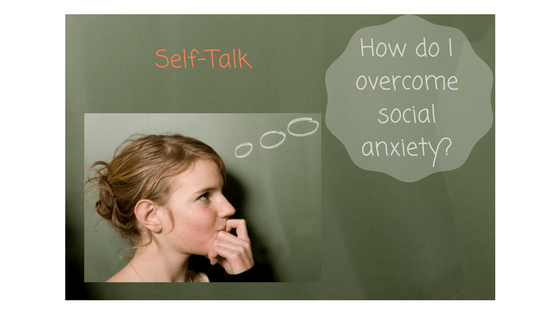→ Previous: Severe vs. normal symptoms
→ Next: How can I desensitize?
Overcoming social anxiety boils down to three things.
1. You gotta really want it! You have two voices. One voice focuses on the fear. The other voice focuses on wanting more freedom and a higher quality of life. The second voice says "I want this now." When the "I want this now" voice is LOUDER, you are motivated. You gotta be motivated to do the next steps.
2. Lots of studies have shown that thinking about things in new ways can reduce anxiety symptoms. So it's about changing your perspective of yourself and other people.
Think about times in your experience where you've changed your perspective on something and it made a huge difference. That's the kind of perceptual shift we're talking about.
In studies with thousands of people with social anxiety and public speaking phobia, it turns out that there are common characteristics or thought patterns. Once those thought patterns get tweaked, we start seeing changes in behavior.
There are seven common social anxiety thought patterns that keep the fear alive. Try to become aware when you are falling into one of these maladaptive thought patterns, and come up with counter-thoughts. Maladaptive thoughts basically get in your way and prevent you from achieving your goals. Counter-thoughts are realistic, truthful and help you achieve your goals.
7 Common Social Anxiety Thought Patterns:
Thought that increases anxiety: Fear is bad and fear symptoms are bad.
Counter-thought: Actually, fear is natural and I should expect it.
See course for detailed explanation. When encountering a false alarm (when my brain thinks the situation is dangerous but it's not dangerous), I will get some adrenaline in my body and I will experience some symptoms. If I don't add fearful thoughts on top of this first layer of fear, I can keep fear to a minimum.
Thought that increases anxiety: Social standards are high and I have to be perfect.
Counter-thought: Actually, social standards are not as exacting as I think, and most people are friendly and supportive.
Thought that increases anxiety: I can read minds.
Do you jump to conclusions and assume people are thinking negative things about you? Studies show that people with public speaking fear/phobia tend to think of social situations as more competitive or hostile than they really are. In many cases, people are thinking neutral or positive things, and people are much more supportive than you might think.
Counter-thought: I can't read minds. I really don't know what other people are thinking unless I ask them. They may be thinking the exact opposite of what I'm imagining.
Thought that increases anxiety: People won't like me or I'll look like a fool.
Focusing on the negative. Research has found that those with social anxiety or public speaking fear tend to focus on the negative (like focusing on the one person in a group who is not smiling) rather than focusing on the positive (like all of the others in the group who are smiling).
Counter-thought: I'm going to look for the positive things that are happening. I'm not going to focus on the negative.
Thought that increases anxiety: Having unclear goals like “I want everyone to like me.” This is unachievable because you’ll never know if you achieved it or not.
Counter-thought: It’s more helpful to focus on goals such as “I want to get my message across clearly so I’m going to talk slowly and make sure that I’m communicating as clearly as I can.”
Thought that increases anxiety: "It's highly likely that I will make a mistake and that something horrible will happen." Overestimating the likelihood that something horrible will happen is the other hallmark of all phobias. This is why I recommended the scrutiny exercises here.
Counter-thought: I am in treatment for social anxiety, and the more I recover, the less likely something bad will happen.
Thought that increases anxiety: "If I make a mistake, it will be horrible and awful." Overestimating negative consequences is one of the hallmarks of all phobias. This is why I recommended the scrutiny exercises here.
Counter-thought: Actually, the consequences of making a mistake is not usually that bad.
See the next blog for the third important step in overcoming social anxiety: Desensitization.
→ Previous: Severe vs. normal symptoms
→ Next: How can I desensitize?
How to overcome social anxiety


